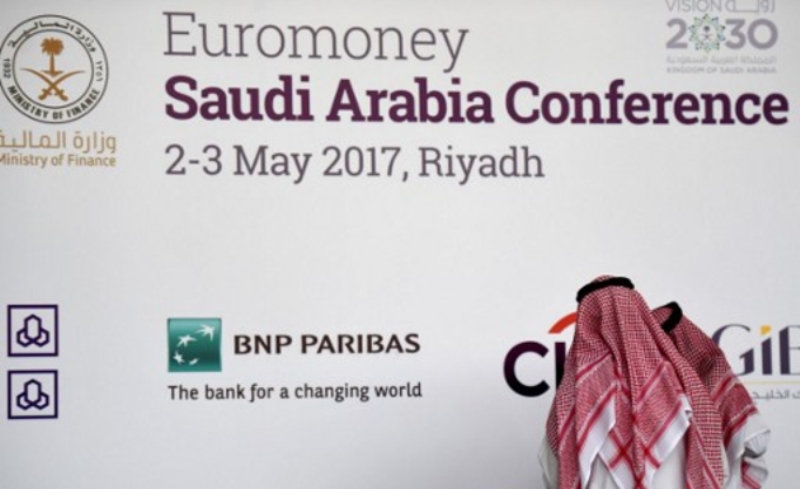Riyadh – Over the past ten years, Saudi Arabia’s financial position has become stronger thanks to the high volume of financial reserves and doubling of the gross domestic product (GDP), Saudi Minister of Finance Mohammed al-Jadaan said.
The minister said that the kingdom holds the third largest currency reserves in the world, adding that the non-oil sector is one of the most vital sectors capable of enhancing the economy. The non-oil sector contributes to about 50 percent of the GDP.
The Kingdom’s public debt is the least among the G20 states which contributes to enhancing economic stability and reducing the negative effects of falling oil prices, according to Jadaan.
Speaking at the 12th Euromoney Saudi Arabia Conference in Riyadh Tuesday, the minister said the government’s fiscal policies are enhancing financial stability and promoting economic growth across Saudi Arabia.
The kingdom aims to develop its industrial, investment and small-medium business base to employ more Saudis and reduce its reliance on oil revenue.
“The Ministry of Finance aims to strengthen the fiscal framework, diversify revenue sources, support non-oil sector growth and achieve the highest levels of transparency, as we aim to create a stronger and more stable economy,” explained the minister.
The Kingdom is witnessing unprecedented qualitative shift in further consolidating its financial position. “The Ministry of Finance has set up a separate unit for economic financial policies aimed at the governance of the ministry’s financial and economic policies and the establishment of a public debt office to manage the Kingdom’s public debt,” he said.
Jadaan added that the public debt office has received great interest from investors for the first international issuance of the Kingdom’s bonds program Tadawul. The total number of applications for these bonds exceeded $33 billion.
According to the minister, the success reflects the strong foundations of the Saudi economy and the trust in Saudi National Transformation Program 2020 and Vision 2030. He pointed out that the government adopted this week ten additional programs that include housing, serving pilgrims, improving lifestyle, strengthening national identity, supporting national leadership of companies, developing national industry and logistical services, public investment fund, strategic partnerships, developing the financial sector, and privatization.
The fiscal policies, according to the minister, aim at diversifying the financing sources and achieving the utmost levels of transparency, adding that the government made a clear commitment that it will increase the level of transparency.
“They will comply with international laws on transparency” and respond to the needs of the private sector which requires timely data to make investment decisions, he added.
The government allocated over $10.6 million for NPT’s initiatives and over $58.6 million to be spent on NPT’s initiatives over the next three years.
The ministry is collaborating with other ministries and state institutions to collect information on the current economic situation and make economic indications in order to achieve Vision 2030 goals.
Jadaan said that for the first time, possibly in a couple of weeks or less, Saudi Arabia will publish its first quarterly results of the budget.
According to him, the government was on track to cut its deficit to about $53 billion this year, and that this year the government has so far payed over 90 percent of its bills to the private sector within 30 days of the due date.
The Kingdom’s program aims to raise the private sector’s contribution from 40 percent to 65 percent of GDP, elevate the nation into the top 10 countries on the Global Competitiveness Index, increase foreign direct investment from 3.8 percent of 5.7 percent of GDP, and increase women’s participation in the workforce to 30 percent.
The world economy is recovering in developed countries as the International Monetary Fund (IMF) expects an international growth from 3.1 percent in 2016 to 3.5 percent in 2017, especially that the US economy is expected to continue improving .
Meanwhile, Ministry of Finance’s Undersecretary for Media and Communication Yaaroub al-Thunyan said the Euromoney Saudi Arabia Conference 2017 has become an international platform and opportunity to discuss Vision 2030 and its goals and initiatives.
During the conference, several officials and experts agreed that Vision 2030 is an opportunity for Saudi Arabia to release its economy from the oil sector control.
